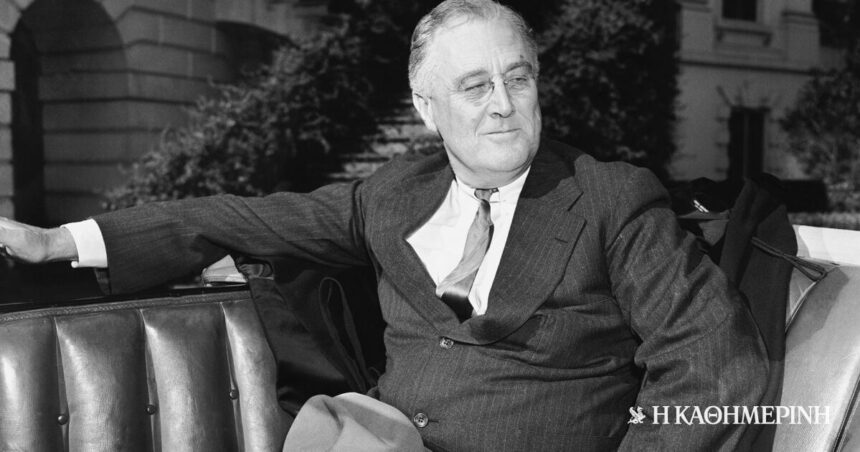“I want you, FDR, to stay and finish the job!” says “Uncle Sam” in a 1944 campaign poster, asking the already three-term president, Franklin Roosevelt, to continue his work. Until then, it was unheard of for an American president to seek re-election after serving two terms. However, the surrounding conditions of World War II, and Roosevelt’s effective management of it, made the elections of both 1940 and 1944 unlike any other – after all, they were being held in the midst of war.
Announcing his candidacy at the Democratic Convention on July 20, 1944, Roosevelt made his position clear: “I am sure you will understand me when I say that my decision, which I formally express to you tonight, is based solely on my sense of obligation to to serve the people of the United States, if they ask me to. I will not campaign in the usual sense. In these days of tragic sadness, I don’t think it’s appropriate. And besides, in these days of world war, I shall not be able to find the time.’
But he is careful to announce his program for the next four years: “What is the task before us in 1944? First, to win the war – to win the war quickly, to win it overwhelmingly. Second, to form world international organizations and make a plan to use the armed forces of the dominant Nations of the world to make another war impossible in the foreseeable future. And third, to build an economy for our returning veterans and all Americans – one that provides jobs and ensures a decent standard of living.”
Many, however, criticized Roosevelt for his fourth consecutive candidacy, sounding the alarm about the concentration of power in the White House, at a time when the consequences of dictatorial regimes were visible all over the world. The discontent of some was cleverly summed up in the phrase “There are only three certainties in this world: death, taxes, and Roosevelt.”
On the other hand, growing concerns about the president’s health were well-founded. Affected by a paralytic disease (probably polio), as early as 1921, Roosevelt used a wheelchair, metal braces, or crutches to walk. In fact, returning from the Tehran Conference in March 1944, the health of the 62-year-old Roosevelt showed an even greater deterioration. After medical examinations, it was found that the president suffered from, among other things, hypertension and was diagnosed with acute heart failure.
Roosevelt’s decision to run for the presidency again, knowing the state of his health, has been explained in various ways, with many suggesting that his sense of duty to bring a victorious end to World War II prevailed. Still others believe that it was important for Roosevelt to personally help shape the postwar world by ensuring that his vision of an international organization that would prevent another world war would become a reality.
Ultimately, despite any criticism or concerns, Roosevelt once again won the election, defeating his Republican opponent, Thomas E. Dewey: he secured 53.4% of the popular vote and 432 Electoral College votes. During his election campaign he managed to show great stamina, despite his obvious fatigue, while a combative campaign speech of his in September 1944 won impressions: referring to his dog, Fala: “These Republican leaders did not content themselves with attacking me, or against my wife, or against my sons. No, they don’t stop there, but now they include my little dog, Fala. Well, of course, I don’t resent the attacks, and my family doesn’t resent the attacks, but Fala does… resent them. […] I’m used to hearing malicious lies about me – like this “old, worm-eaten chestnut” (s.c. means cliché) that I’ve presented myself as necessary. But I think I have a right to resent, to react to slanderous statements about my dog.”
In January 1945, Franklin Roosevelt traveled nearly 14,000 miles away to the Yalta Conference. On March 1, the day after his return to America, visibly exhausted, he spoke to Congress about the Conference, sitting in his wheelchair. It was the first time in his four presidencies that he had made such a public appearance.
On April 12, 1945, 82 days after taking office, Roosevelt died of a stroke. He did not get to see the end of the war or his vision of the post-war world come true. His vice president, Harry Truman, took charge of the country, making important decisions such as the atomic bombing of Hiroshima and Nagasaki. On VE Day, May 8, Truman dedicated the Allied victory to President Roosevelt by ordering flags to be flown at half-staff in his memory.
Despite any criticism, particularly regarding his last two terms, Roosevelt is still regarded today as one of the top three American presidents by his fellow citizens (along with George Washington and Abraham Lincoln). In any case, his politics both before and during the war reshaped the role of government in America, while the creation of social government programs helped redefine liberalism itself.
However, in 1951, the 22nd Amendment to the US Constitution was ratified, which states that a president can serve only two consecutive terms. Thus, Franklin Roosevelt is the only president in American history to be elected to office four times.
Column editor: Myrto Katsigera, Vassilis Minakakis, Antigoni-Despina Poimenidou, Athanasios Syroplakis




